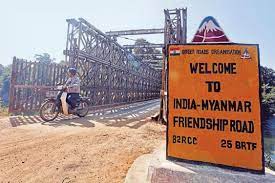
The Naga Students Union Delhi (NSUD) has implored upon the Prime Minister Narendra Modi to revoke revocation of Free Movement Regime (FMR).
The union informs Modi that the decision to implement FMR will have far reaching implications, particularly for the rights of the Naga people, the socio-economic fabric of the Northeast region, the Act East Policy, and India's international image.
In its letter, the Naga Students' Union Delhi (NSUD) expressed deep concern about the Home Ministry's recent move to revoke the Free Movement Regime (FMR) and initiate border fencing along the Indo-Myanmar border.
NSUD pleaded to the Prime Minister to reconsider the decision to revoke the FMR and cease the construction of border fencing along the 1643 km long Indo-Myanmar border.
The union urged the government to engage in meaningful dialogue with all stakeholders, including the Naga people, to address their legitimate concerns and aspirations. The NSUD highlights a few of its concerns regarding the scrapping of the FMR such as the impact on the Rights of the Naga People The NSUD stated that Naga people have a rich cultural heritage and a unique historical background and that FMR has been a crucial aspect of their livelihood and social interaction, allowing Naga to maintain ties with their brethren across the border in Myanmar.
Revoking the regime not only undermines the cultural identity of the Nagas but also infringes upon their fundamental rights to freedom of movement and association, NSUD stated.
The Naga people have long aspired for self- determination and peace in the region. However, the imposition of border fencing and restrictions on movement only exacerbates their grievances and hampers the prospects for a peaceful resolution of the Naga issues, says NSUD.
NSUD stated, “We also invoke the UN Declaration on the Rights of Indigenous Peoples in addressing this issue so that there is a humane and inclusive approach to the issues concerning borders. Moreover, any unilateral decisions without consulting the stakeholders may work to undermine the hard-earned peace negotiations being undertaken between the Indian state and the Nagas.”
In regards to the Socio-Economic Implications in the Northeast, NSUD added that the northeastern border states of India including Nagaland, Manipur, Arunachal Pradesh, and Mizoram have long struggled with developmental disparities and infrastructural inadequacies.
The letter stated that the imposition of border fencing and restrictions on cross-border movement will exacerbate these challenges, further isolating the regions from potential economic opportunities and impeding socio-economic progress.
Moreover, the livelihood of many communities, including those engaged in cross-border trade and commerce, will be severely affected, leading to increased poverty and unemployment, it added.
Such oppressive measures are counterproductive to the government's commitment to fostering inclusive growth and development, and regional stability and harmony in the North-Eastern region, stated the letter.
In regards to the FMR being in contradiction with the Act East Policy, NSUD stated that the Act East Policy aims to promote economic integration and cultural exchange with South East Asian countries, including Myanmar.
However, the decision to impose border fencing and restrict movement contradicts the spirit of this policy. Instead of fostering greater connectivity and cooperation with India's neighbours, it creates barriers and impedes the flow of people and goods across borders, it added.
The decision to impose FMR only undermines the credibility of the Act East Policy but also hampers India's efforts to enhance regional cooperation and integration in the Asia-Pacific region, NSUD said.
On the impact on India's International Image, NSUD stated that India's commitment to upholding human rights, promoting regional cooperation, and fostering good neighbourly relations is essential for maintaining its credibility on the international stage.
The decision to revoke the FMR and initiate border fencing sends the wrong message to the international community, portraying India as a country that prioritizes security over human rights and regional cooperation.
The FMR could have negative repercussions on India's diplomatic relations and image as a responsible global actor, it added.

The Hills Journal
K. Salbung, Churachandpur
Manipur-795128